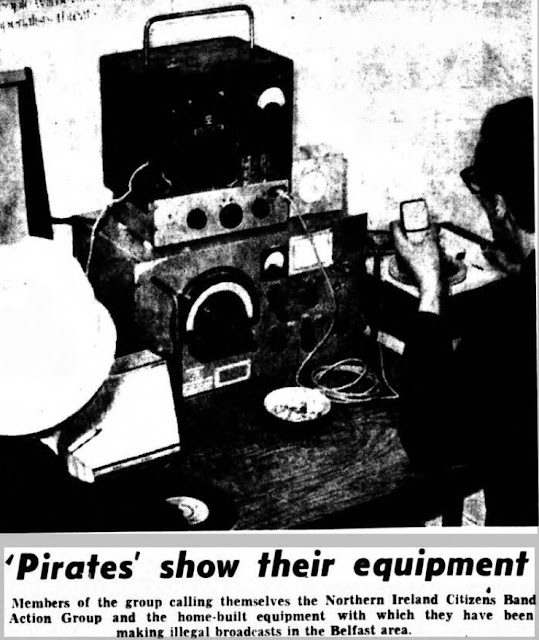In July 2019, the esteemed
and world renown pioneer of renewable energy Professor Godfrey Boyle passed
away. But not only was Mr. Boyle the professor emeritus of renewable energy and
the director of the Energy and Environment Research Unit in the Open
University's Faculty of Mathematics, Computing, and Technology, he was a
pioneer in pirate radio broadcasting.
On a number of pirate
radio forums there was some scepticism and questioning that a pirate radio
station could broadcast from a telephone box, but Professor Boyle and his then
student friends were the pirates behind these broadcasts.
In February 1968, using a
homemade transmitter, a tape recorder and an aerial attached from the roof of
the phone box to a nearby tree, their station was on the air broadcasting from
the corner of Lennoxvale and Malone Road in Belfast (there is a telephone box still located on the site). The tape recording began
with "You are now listening to an illegal broadcast and are committing an
offence under the Wireless Telegraphy Act. We will now allow you a few
minutes to switch off.' The operators knew and indeed hoped that it would be discovered by officials
from the detection unit of the GPO in Belfast and used it as a publicity stunt
in an attempt to liberalise the airwaves in Belfast. Their station broadcasting on 242m was known as Radio SRCIS and these initial broadcasts began a cat and mouse game with the authorities throughout 1968.
The Belfast Telegraph
reported that
‘No
action likely over kiosk radio THE GPO were to-day investigating the finding of
pirate radio equipment in a Malone Road telephone kiosk, but there is a
possibility they may decide to drop the whole matter. A spokesman said to-day:
"If this is the end of the illegal transmissions I doubt if we will pursue
our inquiries. But if it should start again, we would have to give the matter
further thought." The transmitting equipment. including a tape recorder
and aerial wire extending from the kiosk to a tree, was discovered by engineers
who toured the city yesterday using monitoring equipment. According to the
spokesman, the equipment found in the 'phone box was a lot of "old
stuff" of little value. It was probable the GPO would dispose of it.’
The incident was even raised in the British House of Commons when Sir Knox Cunningham, MP for South Antrim asked the British Postmaster-General Edward Short what steps would be taken to prevent the use by radio pirates of Post Office equipment in Ulster. The PMG replied "The apparatus was traced and removed by Post Office engineers" and added. "I do not propose to take any special precautions against a repetition".
Not deterred by the loss
of their transmitter Mr. Boyle and his fellow students at Queens University
just a short distance from Malone Road set up a rag week pirate station in
March. Broadcasting on 235m, Rag Radio was on the air. The station’s signal was
heard over three miles from the station’s transmitter located near the
University. At one stage the police laid siege to the Students Union headquarters
in the mistaken belief that the pirate transmitter was located there.
On April 19th 1968, the
Belfast Telegraph under the headline ‘Ulster Radio Pirates, A Year on the Air’
reported that,
‘Northern
Ireland’s radio "pirates" were on the air again last night and to-day
a spokesman disclosed that they have been making illegal broadcasts in the
Belfast area sporadically for a year. It is now believed that five or six young
men in their twenties, mostly students, are behind the broadcasts and that
their equipment is home-built. "The broadcasts began as series of
experimental transmissions by people interested in radio. Then we formed the
idea that we should be allowed to make broadcasts legally." said the
spokesman for the group who. call themselves the Northern Ireland Citizens'
Band Action Group. Recent broadcasts have mixed records with demands for new
wireless telegraphy legislation to make available a waveband for the use of private
citizens and to set up commercial stations. The spokesman claimed that the
situation which allows the Government-run BBC radio monopoly is undemocratic.
"People are entitled to run their own newspapers as a means of
communication and there are commercial television stations. Why not commercial
radio?" He said that incident' some weeks ago when transmission equipment
was found in a phone box on the Malone Road was designed to draw attention to
their ideas.’
Professor Boyle was born
in Brentford, West London, to Kevin Boyle, a quantity surveyor, and his wife,
Phyllis. The family moved to Belfast when Professor Boyle was a baby where he
and his sister, Mary, grew up. His early education was at St Malachy’s college before
he enrolled for an electrical engineering degree at Queen’s University Belfast,
where he ran societies, published alternative magazines, and was part of radical
activities in the University in a province that was on the brink of the
Troubles. In 1975 his influential book ‘Living
on the Sun’ was published, which advanced the then novel idea that industrial
countries could make a transition to renewable power.
Professor Godfrey Boyle,
a pirate radio pioneer, May He Rest In Peace






No comments:
Post a Comment